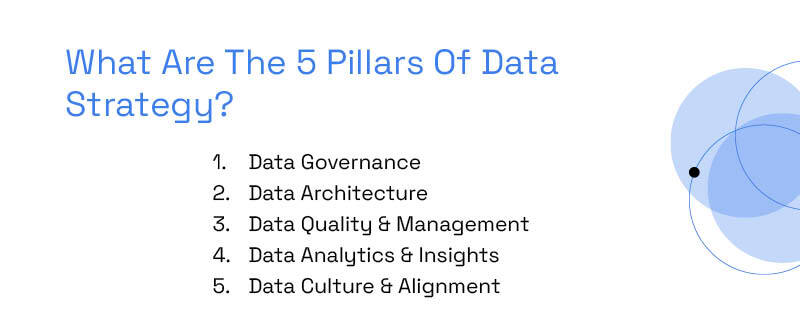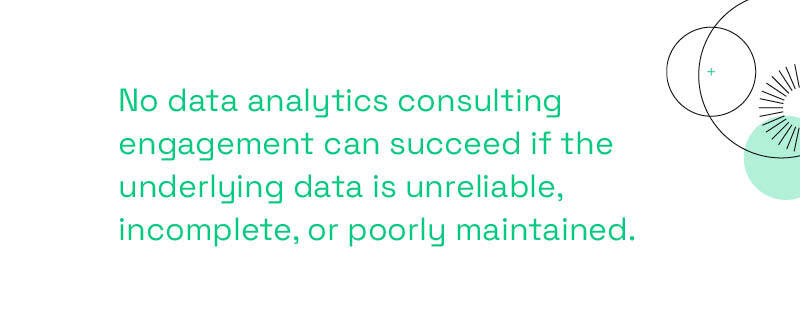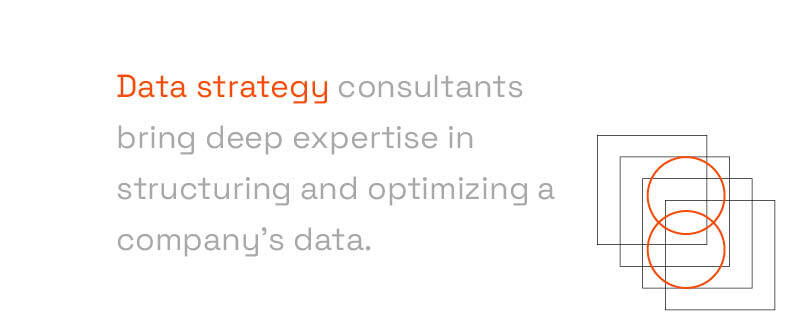What Is A Data Strategy Consultant?
Data strategy consultants are business transformation catalysts who bridge the gap between complex data landscapes and actionable growth strategies. While they possess deep technical prowess akin to data analysts, their true genius lies in weaving those insights into the fabric of your overarching business objectives. By aligning data initiatives directly with strategic vision, data strategy consultants ensure that data becomes not just an operational tool, but a key driver of competitive advantage.
In modern organizations, a data strategy consultant does far more than just sift through spreadsheets or design dashboards. They act as strategic advisors—think of them as the executive partners who translate technical signals into decisions that move your business forward. Whether you’re navigating the jungle of data science consulting services or scaling up data analytics consulting for small business needs, these consultants cut through the noise and focus on measurable outcomes, not passing technology fads.
Why Integrate Data Strategy Consulting into Your Business Strategy?
Separating data from business direction is a dangerous game in today’s fiercely competitive market. Organizations that embed data into their core business strategy can rapidly identify new revenue streams, optimize operations, and adapt with agility. The result? Data isn’t just supporting the business—it is the business. Data strategy consultants serve as expert partners, guiding organizations in aligning data initiatives with business goals across the entire organization.
Consultants, like the data strategy consultants at P3 Adaptive, champion this integration by looking beyond isolated analytics projects and providing tailored consulting services. Instead, they ensure your data efforts are always synced with real business goals, decreasing risk and amplifying ROI every step of the way. Through their consulting services, companies can achieve a competitive edge and sustainable growth by leveraging data-driven insights and innovation.

What Are The 5 Pillars Of Data Strategy?
The 5 pillars of data strategy serve as the critical infrastructure that transforms your scattered business information into a revenue-generating powerhouse. These pillars—Data Governance, Data Architecture, Data Quality & Management, Data Analytics & Insights, and Data Culture & Alignment—work in tandem to ensure your organization gains more than just a rear-view mirror on your operations. Before you develop tailored strategies, it’s essential to assess your current data and data capabilities to identify gaps and opportunities for improvement. By leveraging the right solutions and strategies, you can unlock the full potential of your business information, driving innovation and value. Instead, they empower proactive decision-making and future-proof your strategic goals. Ignoring even one of these pillars can leave your company exposed to compliance nightmares, operational blind spots, and missed growth opportunities. Embracing all five? Developing robust processes and implementing solutions across these pillars builds organizational capabilities and data capabilities that support sustainable growth. That’s how successful business leaders unleash lasting value.
What Is Data Governance in a Modern Data Strategy?
Data governance is the bedrock for trust, security, and compliance. Your data is only as valuable as it is safe and accessible to the right people. By setting clear guidelines and protocols for privacy, access, auditing, and compliance (think GDPR, CCPA, and industry-specific regulations), and by defining data owners responsible for maintaining data quality and compliance, governance transforms risk into reliability. For data strategy consulting clients, a mature governance framework also enables faster responses to legal changes and external threats. Strong data management and optimized data practices are integral to effective governance, ensuring your organization maximizes the value of its data assets. P3 Adaptive’s approach weaves governance deeply into all other pillars, not treating it as a bureaucratic afterthought, but as a high-impact enabler of digital trust and agility.
How Does Data Architecture Create Business Value?
Data architecture is your organizational blueprint for how data is stored, connected, shared, and surfaced. Developing scalable architectures and creating systems that can transform raw data into valuable insights is essential for building a strong data foundation. With tools like Microsoft Fabric and architectures powered by Azure, leveraging artificial intelligence and advanced analytics maximizes the value of your current data, liberating your most important data from siloes and making it accessible for analytics, AI, and operations. For small businesses, right-sizing your architecture means scalability without unnecessary cost and tech sprawl. For enterprises, it means weaving together disparate sources into smooth, actionable pipelines—so you can stop asking where your data is and start demanding what it can do for your business.

Why Data Quality & Management Can’t Be Overlooked
No data analytics consulting engagement can succeed if the underlying data is unreliable, incomplete, or poorly maintained. Data quality & management are about more than cleaning records for a month-end report; through well-defined processes, organizations can transform raw data into actionable insights that drive strategic decision-making and business value. They enable timely, automated checks, ongoing accuracy, and stewardship models that keep information as fresh and accessible as your business demands. When your team can trust the data, they can act faster, build stronger cases for investment and innovation, and avoid embarrassing missteps. That’s a clear differentiator for any business leader serious about growth.
How Do Analytics & Insights Drive ROI?
The fourth pillar, data analytics & insights, transforms raw information into precise, actionable business intelligence. The data strategy consulting process leverages data and analytics to ensure organizations achieve the most value from their investments and drive better decisions that align with business goals. Leveraging platforms like Power BI and advanced consulting from teams like P3 Adaptive, you get dashboards and predictive models that do more than decorate your meetings—they spark new revenue streams and streamline costs. For consulting clients, democratizing access to analytics (so the right stakeholders see the right insights at the right time) translates directly into accelerated decision cycles and measurable margin improvements. This approach leads to improved business outcomes by ensuring that analytics initiatives directly support strategic objectives. In other words: smarter data, richer returns.
What Role Does Data Culture & Alignment Play?
The fifth, often underestimated pillar is data culture & alignment. Even the most robust tools and perfect data sets are useless without leadership buy-in and a culture that champions informed, collaborative decision-making. For data analytics consulting for small business, this pillar means fostering the mindset that every department—finance, ops, marketing—plays a key part in data-driven success. Aligning data culture with company goals and leveraging customer data leads to improved experiences for customers and ensures that data-driven initiatives support long-term organizational success.
For larger organizations, it’s about bridging the gap between strategy and execution, ensuring your data investments directly support business goals. Understanding customer needs and integrating customer data is essential to benefit the entire organization, enabling better decision-making and delivering value to every customer. At P3 Adaptive, our consultants help clients create these ongoing conversations—so data isn’t a side project, but the heartbeat of your organization’s innovation engine.
What Does A Data Strategist Do?
Data strategists serve as the critical bridge between an organization’s data assets and its highest-level business goals. Data strategy consultants bring deep expertise in structuring and optimizing a company’s data, helping companies of all sizes benefit from tailored data strategy services that drive innovation, growth, and competitive advantage. Their main responsibility is not simply analyzing data, but ensuring that every data initiative maps directly to strategic objectives and measurable ROI. At P3 Adaptive, this role means ongoing collaboration with business leaders to identify transformative opportunities, advise on next-generation tools like Power BI, Microsoft Fabric, and Azure, and keep data strategy operating as an engine for business growth.

Rather than reacting to the latest industry buzzword, a seasoned data strategist is a proactive partner. Their mission is to align every data project — from integrating systems to rolling out self-service analytics — with the broad goals that matter to the C-suite. When selecting the right consultant, it’s important to focus on their expertise and ability to guide data initiatives that align with business priorities. Understanding market trends, leveraging more data, and executing a comprehensive data strategy can help unlock the full potential of a company’s data assets. This continuous alignment translates to smarter investments, minimizes waste, and ensures organizations are always leveraging data to move the needle, not just tick boxes.


